- europages
- >
- COMPANIES - SUPPLIERS - SERVICE PROVIDERS
- >
- aggregates
Results for
Aggregates - Import export
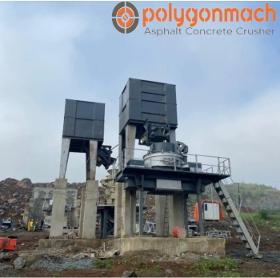
POLYGONMACH MAKINE SANAYI VE TICARET LTD STI
Turkey
A 700-1000 TPH Gabbro Crushing Screening Plant is an industrialized facility created for handling huge amounts of gabbro rock and processing it into various aggregate sizes needed for various construction and industrial purposes. Such plants, with their capability for processing between 700 and 1,000 tons of gabbro per hour, are crucial in running large-scale operations where efficiency and high output are important. They have heavy machinery that will crush the rough, coarse-grained gabbro rock into medium manageable and then sort it out according to sizes. That will make them perfect for use in those projects that demand large volumes of highest-quality aggregate, which includes highway construction, airport runways, and large infrastructure projects. The plants are not all about brawn; they are technological masterpieces put into place to ensure there is accuracy in the crushing and screening departments.
Request for a quote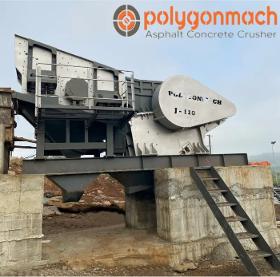
POLYGONMACH MAKINE SANAYI VE TICARET LTD STI
Turkey
It is a 250-350 TPH capacity Gabbro Crushing Screening Plant engineered to perform important functions in the natural production of large volume gabbro stone material effectively. It, in most instances, carries the processing of 250-350 tons in an hour. The plant incorporates the most advanced crushing and screening technology to produce good-quality output. Normally, it all starts with the primary crushers, normally jaw crushers that crush big gabbro rocks into smaller pieces. Basically, the primary size reduction serves to kind of condition the material to a state where further processing can be achievable. Tertiary and secondary crushers secure the appropriate sizing of the material after a primary crusher. The crushed gabbro later on is classified by the vibrating screens into different sizes in order to assure reliability in the final aggregates that conform to the needs, requirements, and specifications of constructions.
Request for a quote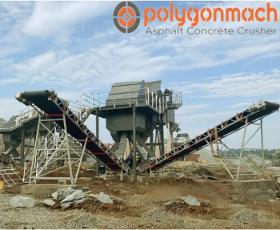
POLYGONMACH MAKINE SANAYI VE TICARET LTD STI
Turkey
The 40-60 TPH Gabbro Crushing Screening Plant is a facility specially made to process gabbro stone material with production capacity between 40 to 60 tonnes per hour. This type of plant design allows crushing and screening operations to be carried out effectively, generating top-quality gabbro aggregates within such a specific throughput range. Primarily, the plant begins with primary crushers—like jaw crushers—that break raw gabbro down into smaller size fractions. Secondary and tertiary crushers further reduce the size of the material as required down the line. The crushed material is then screened through a vibrating screen into different classified size fractions of gabbro for the end product of aggregates to be within the specified criteria. This will make such 40-60 TPH capacity gabbro crushing screening plant an ideal solution to many major problems experienced in the construction and mining industries.
Request for a quote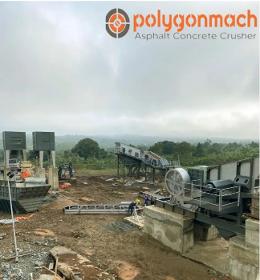
POLYGONMACH MAKINE SANAYI VE TICARET LTD STI
Turkey
The gabbro crushing and screening plant shall be designed capable of processing gabbro, a kind of coarse-grained, dark-colored, and dense igneous rock. Gabbro majorly consists of calcium-rich plagioclase feldspathoid and pyroxene; at times, it also contains olivine, hence very strong. This toughness makes gabbro an excellent source of construction aggregates and road base, but it requires a very robust processing facility to crush and screen efficiently into usable products. Plants for crushing and screening of gabbro are equipped with various heavy-duty machinery, including crushers, screens, and conveyors, all working together to break down large hunks of gabbro into aggregate of varied sizes. The end products are used in different construction projects whereby strength, durability, and quality are paramount concerns.
Request for a quote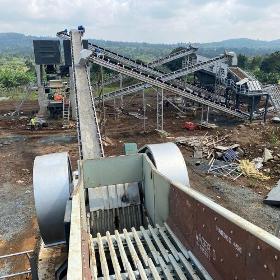
POLYGONMACH MAKINE SANAYI VE TICARET LTD STI
Turkey
These plants long lifespan makes them ideal for large-scale mining quarrying and recycling operations where the volume and consistency of the material being processed necessitate a dependable long-term solution with high productivity. Portable crushing plants can be built with specific operational requirements in mind taking into account factors like the type of material to be processed capacity requirements end-product specifications and spatial constraints unique to the site. The plant will be able to manage the expected throughput and material properties with this level of personalization providing a tailored solution that maximizes the profitability and productivity of the operations. Modern technology features like automation and monitoring systems which provide operators with precise control over the crushing process are integrated into operations to further improve their efficiency safety and scalability.
Request for a quote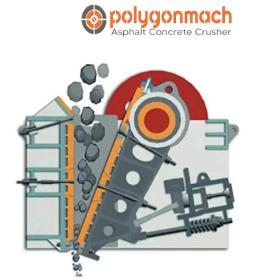
POLYGONMACH MAKINE SANAYI VE TICARET LTD STI
Turkey
In order to reduce size sort and separate different kinds of materials including stones ores and minerals crushing and screening plants also called crushing and screening systems are facilities used for this purpose. Screens are used to sort or separate the crushed material according to size shape or other properties. These plants normally consist of crushers for breaking large materials into smaller pieces. Plants for crushing and screening primarily serve to change raw materials into the precise sizes or forms needed for additional processing or use in a variety of industries including mining construction and recycling. While the screening equipment divides the crushed material into various fractions according to predetermined criteria the crushing equipment aids in the breakdown of large materials into manageable sizes.
Request for a quote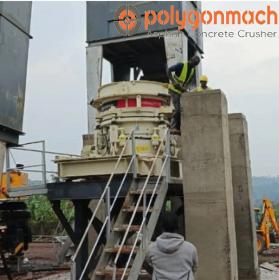
POLYGONMACH MAKINE SANAYI VE TICARET LTD STI
Turkey
A (VSI) Vertical Shaft Impact Crusher, commonly known as VSI crusher, is a type of crushing machine that utilizes a high-speed rotor with wear-resistant tips or anvils to crush materials into fine particles. Unlike conventional crushers that use compression or impact forces to break down materials, VSI crushers operate by throwing the material against stationary anvils, shaping the material into desired sizes. This process occurs as the rotor spins at high speeds, centrifugal forces propel the material outward, and the impact between the material and the anvils crushes the material into smaller particles. (VSI) Vertical Shaft Impact Crusher are renowned for their ability to produce well-shaped cubical end products and are commonly used in the production of high-quality aggregates, sand, and other construction materials. (VSI) Vertical Shaft Impact Crusher are versatile machines that find widespread applications in various industries, including mining, quarrying, and construction.
Request for a quote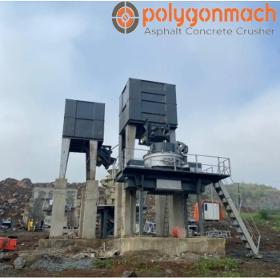
POLYGONMACH MAKINE SANAYI VE TICARET LTD STI
Turkey
Anvils or wear-resistant tips mounted on a high-speed rotor are used by Vertical Shaft Impact Crushers (VSI crushers) to crush materials into fine particles. VSI crushers function differently from conventional crushers which break down materials using compression or impact forces by flinging the material against stationary anvils that shape it into the appropriate sizes. The material is driven outward by centrifugal forces as the rotor spins quickly and it is crushed into smaller particles by the materials impact with the anvils. Vertical Shaft Impact Crushers are widely used in the manufacturing of high-quality aggregates sand and other construction materials. They are known for their ability to produce end products that are well-shaped and cubical. One of the most versatile tools in mining quarrying and construction is the vertical shaft impact crusher.
Request for a quote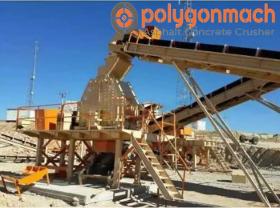
POLYGONMACH MAKINE SANAYI VE TICARET LTD STI
Turkey
A Tertiary Impact Crusher can be understood as a kind of crushing machine to carry out further reduction of material past primary and secondary crushers. The Tertiary Impact Crusher works as an HSI. The stocky rotor customer-engineered by General Kinematics to have impact tools blowing bars or hammers turning at higher speeds smashes the material. These impact tools work extremely fast to achieve impacts that will break down the material into small, homogenized, and delicate particles. Our Tertiary Impact Crushers are designed for making optimal shaped aggregates and crushed materials with high fineness, for maximum control over particle size and shape and contributing to the achievement of product requirements in various industries and applications. Tertiary Impact Crushers are important in the final stage of crushing. This has been declared to be the final shattering that the materials undergo, which puts them to the characteristics needed in the end product.
Request for a quote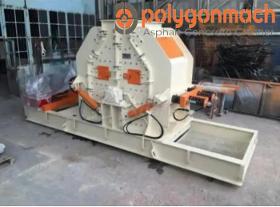
POLYGONMACH MAKINE SANAYI VE TICARET LTD STI
Turkey
The Horizontal Shaft Impactor (HSI) commonly referred to as a Tertiary Impact Crusher is a type of crushing equipment used to further reduce materials that have been processed through primary and secondary crushers into even finer particles. The last stage of crushed materials with exact particle sizes and shapes are usually produced by tertiary impact crushers. They work by applying high-speed impacts to break down the material using a horizontal shaft fitted with hammers or blow bars. A tertiary impact crushers main purpose is to refine the product to the appropriate size and shape in order to meet particular needs in a variety of applications including mining recycling and aggregate production. By producing finely crushed products appropriate for end-use applications tertiary impact crushers play a critical role in the last stage of material processing.
Request for a quote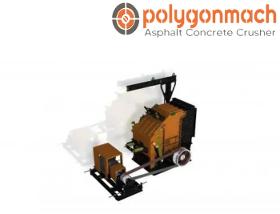
POLYGONMACH MAKINE SANAYI VE TICARET LTD STI
Turkey
A Secondary Impact Crusher is a type of crushing machine that typically comes in the form of a Horizontal Shaft Impactor (HSI). This crusher is designed to provide secondary or tertiary crushing capabilities by generating high-speed impact forces to further reduce the size of the material processed. In comparison to a Primary Impact Crusher, a Secondary Impact Crusher is usually aimed at producing smaller, finer particles and more refined end products. It operates by utilizing a rotating rotor equipped with impact tools such as hammers or blow bars that strike the incoming material, causing it to break apart through impact forces. Secondary Impact Crushers are commonly used after primary crushers in various industries such as mining, quarrying, and recycling to achieve a more refined product size or shape. These crushers excel at producing well-shape aggregates, finely crushed materials, and secondary applications requiring fine particle sizes.
Request for a quote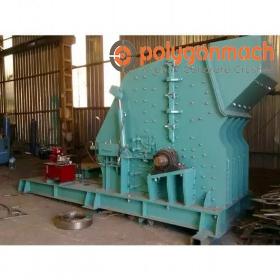
POLYGONMACH MAKINE SANAYI VE TICARET LTD STI
Turkey
Similar to a primary impact crusher a secondary impact crusher (HSI) is a kind of crushing equipment that produces products with a finer more uniform size. Secondary impact crushers are frequently used following the primary crushing stage because they can handle smaller feed sizes than primary crushers. The material enters the crusher and is struck by hammers or blow bars attached to a rotor which breaks the material apart and reduces its size even more. The capacity of secondary impact crushers to produce high-speed impacts that pulverize material into a finer product appropriate for secondary crushing or final applications in a variety of industries is well known. The capacity of Secondary Impact Crushers to generate a variety of products such as fine aggregates sand and finely crushed materials accounts for their adaptability. In industries like mining and recycling or in the manufacturing of asphalt and concrete aggregates where a higher level of product refinement is necessary
Request for a quote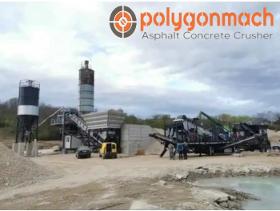
POLYGONMACH MAKINE SANAYI VE TICARET LTD STI
Turkey
Mobile Jaw and Cone Crusher 3-PMCC3 are mobile equipment used in the quarries, mining field, construction sector, and similar industries. Primarily, their application is intended for size reduction and processing large mineral sizes. These tools are majorly used for crushing in a primary stage and secondary stage. The process of crushing big stones is carried out by a jaw crusher; the machine used to perform the process of crushing those big stones into smaller sizes is called a machine. This means that its mobility permits its transport to different work sites. This, therefore, makes them flexible and efficient. Mobile Jaw and Cone Crusher 3-PMCC3 is most essential and very useful in the processing and grinding of materials whereby the quality of the end product needed is accomplished in industrial applications.
Request for a quote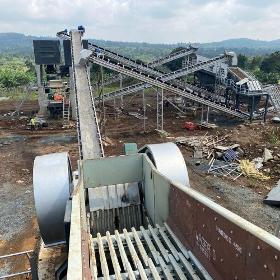
POLYGONMACH MAKINE SANAYI VE TICARET LTD STI
Turkey
The 350-500 tph Granite Crushing and Screening Plant is one of the large full-featured plants unveiled for the market, designed to generate quality granite aggregate, at processing intensity levels from 350 to 500 TPH. These plants come championed with primary crushers, secondary crushers, operating conveyors and feeders, vibrating screens, all gruesomely engineered for optimum crushing and screening effectively. The primary crushers are expected to reduce oversize granite rocks into properly sized fragments for processing to produce more value-added building material. The secondary crushers are for a finer aspect of anything so that they reach the ideal size aggregate, and the vibrating screens perform an accurate classification of the crushed stone into different fractions, by size. Such stringent screening ensures that the end aggregates are produced of remarkable quality for use in various kinds of construction work and infrastructural projects as well as in many industrial applica
Request for a quote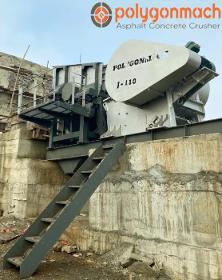
POLYGONMACH MAKINE SANAYI VE TICARET LTD STI
Turkey
The 50-100 tph Riverstone Crushing and Screening Plants shall produce high quality aggregates out of Riverstones at an efficiency in a throughput capacity range of 50 to 100 tons per hour. Prescreening, primary crushing, screening machineries, and conveyors need to be set up for the processing of Riverstones especially for setting up the main infrastructure with suitable size fractions for construction, landscaping, and industrial purposes. The primary crushers at such plants include jaw or impact crushers, which take the raw Riverstones and break them into smaller fragments to kick off the processing. The process of screening separates these aggregates in sizes according to any given project's specifications. The break sizes are specified in applications; the size is directly proportionate to the life of the road. The vigorous screening process guarantees the final aggregates within very tight quality standards for varied applications and makes
Request for a quote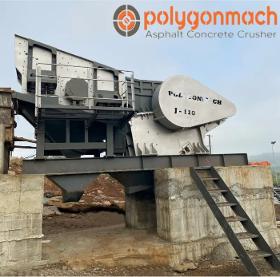
POLYGONMACH MAKINE SANAYI VE TICARET LTD STI
Turkey
100-150 tph Basalt Crushing and Screening Plants are specialized facilities designed for processing basalt stones into various sizes of aggregates at a throughput capacity ranging from 100 to 150 tons per hour. These plants are equipped with machinery and equipment tailored for handling basalt, a durable volcanic stone known for its strength and versatility. The primary function of these plants is to crush large basalt stones into smaller fragments and then screen them to produce high-quality aggregates suitable for applications in construction, infrastructure development, and industrial projects. By efficiently processing basalt, these plants play a vital role in producing robust materials essential for various construction endeavors requiring resilient and reliable aggregates.
Request for a quote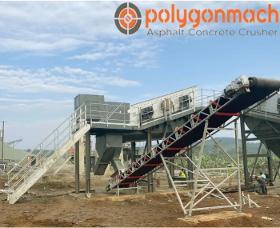
POLYGONMACH MAKINE SANAYI VE TICARET LTD STI
Turkey
A 150-250 tph Basalt Crushing and Screening Plant is a progressive facility that processes 150-250 tons of basalt stone at input sizes of 600 mm, into end products of 0-5mm, 5-12 mm, 12-24 mm. These are appropriate for road constructions as well as commercial purposes. These plants are generally designed to crush large basalt rocks into smaller fragments and screen them to produce high-quality aggregates suitable for applications in construction, infrastructure development, and industrial projects. Manufacturing robust materials by means of efficient basalt processing, these plants are important contributors to the various construction endeavors that must be carried with the utmost certainty in mind.
Request for a quoteDo you sell or make similar products?
Sign up to europages and have your products listed
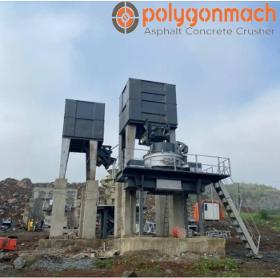
POLYGONMACH MAKINE SANAYI VE TICARET LTD STI
Turkey
A 700 1000 TPH Limestone Crushing and Screening Plant is a facility designed to process limestone raw material into high-quality aggregates with a throughput capacity of 700 to 1000tons per hour. These plants are specifically designed to cater to the demands of different industries like construction, road building, and landscaping, where such high-quality limestone aggregates are required. It usually hosts primary crushing equipment, screening machinery, and conveyors—all designed to handle limestone material conveniently. The initial processing of larger limestone rocks into smaller, more workable fragments is done with primary crushers like jaw crushers and cone crushers. This is very important for the sizing of the raw limestone material, required for further processing, into a size that is ready for making the final product, as per the defined size and quality requirements.
Request for a quote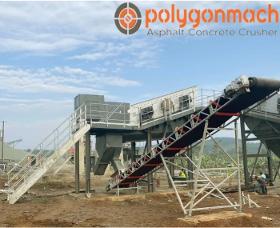
POLYGONMACH MAKINE SANAYI VE TICARET LTD STI
Turkey
350-500 tph Riverstone Crushing and Screening Plants are specialized facilities designed to process Riverstones into high-quality stone aggregates within a throughput capacity range of 350 to 500 tons per hour. These plants consist of essential components such as primary crushing equipment, screening machinery, and conveyors tailored to efficiently handle Riverstone materials. The primary crushing stage involves crushers like jaw crushers, cone crushers, or impact crushers that break down large Riverstones into smaller fragments, preparing them for subsequent processing within the specified throughput capacity. Following primary crushing, the material is directed to screening equipment, such as vibrating screens, which classify the Riverstone aggregates into different fractions based on size requirements. This careful screening process ensures that the final aggregates meet stringent quality standards essential for various construction, landscaping, and industrial applications.
Request for a quote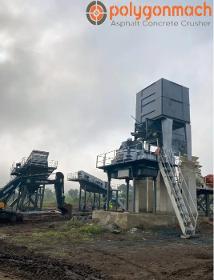
POLYGONMACH MAKINE SANAYI VE TICARET LTD STI
Turkey
250-350 tph Riverstone Crushing and Screening Plants are specialized facilities designed to process Riverstones into high-quality stone aggregates within a throughput capacity range of 250 to 350 tons per hour. These plants consist of essential components such as primary crushing equipment, screening machinery, and conveyors tailored to handle Riverstone materials efficiently. The primary crushing stage involves crushers like jaw crushers, cone crushers, or impact crushers that break down large Riverstones into smaller fragments, preparing them for subsequent processing within the specified throughput capacity. Following primary crushing, the material is directed to screening equipment, such as vibrating screens, which classify the Riverstone aggregates into different fractions based on size requirements. This meticulous screening process ensures that the final aggregates meet stringent quality standards necessary for various construction, landscaping, and industrial applications.
Request for a quote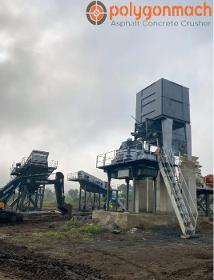
POLYGONMACH MAKINE SANAYI VE TICARET LTD STI
Turkey
150-250 tph Riverstone Crushing and Screening Plants are specialized facilities designed to process Riverstones into high-quality stone aggregates within a throughput capacity range of 150 to 250 tons per hour. These plants consist of essential components such as primary crushing equipment, screening machinery, and conveyors tailored to handle Riverstone materials efficiently. The primary crushing stage involves crushers like jaw crushers, cone crushers, or impact crushers that break down large Riverstones into smaller fragments, preparing them for subsequent processing within the specified throughput capacity. Following primary crushing, the material is directed to screening equipment, such as vibrating screens, which classify the Riverstone aggregates into different fractions based on size requirements. This meticulous screening process ensures that the final aggregates meet stringent quality standards necessary for various construction, landscaping, and industrial applications.
Request for a quote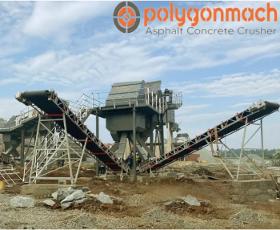
POLYGONMACH MAKINE SANAYI VE TICARET LTD STI
Turkey
The capacity range to process Riverstones in designing 50-100 tph Riverstone Crushing and Screening Plants is up to high-quality aggregates, sometimes between 50 and 100 tons per hour. This plant works by first feeding raw Riverstones into primary smashing equipment, such as jaw smashers or impact smashers, which do play a very important role in the smashing of the bigger stones of Riverstones into smaller fragments of stone at the start of processing. The primary crushing stage is a very important part of the process for producing raw material to be fed into the later stages of the process, with a specified range of throughput capacity, to ensure that the river stones are well processed into the premium stone aggregates required for construction, landscaping, and industrial applications. Screening is then done as the next stage following primary crushing; this may be done mainly using vibrating screens, thus classifying the riverstone aggregates into the required fractions based on si
Request for a quote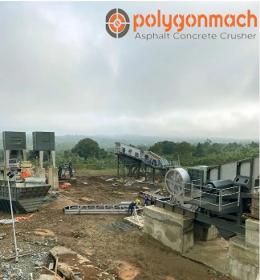
POLYGONMACH MAKINE SANAYI VE TICARET LTD STI
Turkey
A 40-60 TPH Limestone Crushing and Screening Plant is a facility designed to process limestone raw material into high-quality aggregates with a throughput capacity of 40 to 60 tons per hour. These plants are specifically designed to cater to the demands of different industries like construction, road building, and landscaping, where such high-quality limestone aggregates are required. It usually hosts primary crushing equipment, screening machinery, and conveyors—all designed to handle limestone material conveniently. The initial processing of larger limestone rocks into smaller, more workable fragments is done with primary crushers like jaw crushers and cone crushers. This is very important for the sizing of the raw limestone material, required for further processing, into a size that is ready for making the final product, as per the defined size and quality requirements.
Request for a quote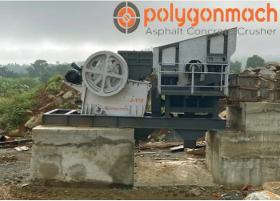
POLYGONMACH MAKINE SANAYI VE TICARET LTD STI
Turkey
350-500350-500 tph Dolomite Crushing Screening Plants are modern industrial plants designed to process dolomite ore in order to produce a great variety of dolomite aggregates that are demanded by different construction projects. The abbreviation "tph" itself means the capacity of the plant dealing with the amount of material per hour; therefore, this plant processes 350 to 500 tons of dolomite ore in an hour. Dolomite, the calcium magnesium carbonate mineral, is very essential in the construction industry in making concrete aggregates and road base materials, among other important construction materials. These high-capacity plants play an important role in the crushing and screening of dolomite ore efficiently into specified requirements for construction projects, thereby ensuring a constant supply of superior quality dolomite aggregates for construction applications.
Request for a quote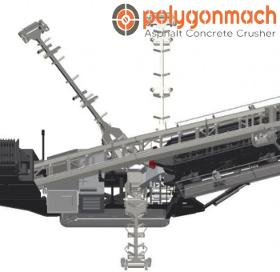
POLYGONMACH MAKINE SANAYI VE TICARET LTD STI
Turkey
The Model PTV 900 VSI Crusher is designed for unmatched performance and efficiency that range from applications that are very diverse. With the advanced rotor type-closed at 900 mm or opsided at 1,000 mm, this VSI crusher ensures maximum material crushing while producing quality output. It is suitable for various materials to be processed since the maximum feed size that can be handled by the crusher is 50-80 mm. Up to 43,000 kg of weightiness is equipped into this crusher to work under harsh conditions at each project. It assures outstanding results.The PTV 900 VSI Crusher has an advanced rotor design to improve its ability in crushing. Depending on specific applications, flexibility is provided by the closed rotor, with a diameter of 900 mm, or with an optional opsided rotor at 1,000 mm. With such advanced rotor engineering, an effective material reduction and better cubic-shaped aggregates are ensured.
Request for a quote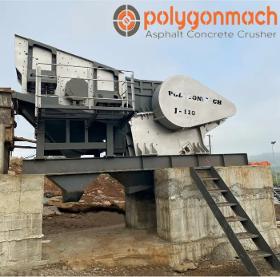
POLYGONMACH MAKINE SANAYI VE TICARET LTD STI
Turkey
It's designed for processing dolomite ore and producing aggregates of diversified sizes suitable for construction. "TPH" is short for "tons per hour" meaning is capable of processing 100 to 150 tons of dolomite ore per hour. Dolomite is a kind of carbonate mineral, which includes calcium magnesium carbonate. It is normally applied in construction for the production of concrete, road bases, and other equally important materials. Improved into a special plant, crushing and screening dolomite assures continuous production of high-quality aggregates required for various construction works.
Request for a quote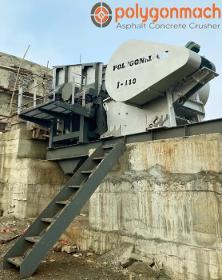
POLYGONMACH MAKINE SANAYI VE TICARET LTD STI
Turkey
A 50-100 TPH dolomite crushing screening plant is one constructed to process dolomite ore into various sizes of aggregates that are used in the construction. "TPH" represents "tons per hour"; the plant has the ability and capacity to deal with between 50 and 100 tons of dolomite ore every hour. Dolomite is a widely used carbonate calcium magnesium carbonate mineral in construction. Basic work undergone by the plant includes the crushing and screening of dolomite in an efficient manner to produce different sizes of aggregates for its concrete, road bases, and other construction uses.
Request for a quote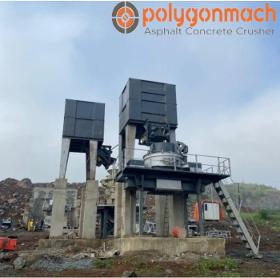
POLYGONMACH MAKINE SANAYI VE TICARET LTD STI
Turkey
Dolomyte, also called dolostone, is a sedimentary rock that contains large quantities of crushed Dolomyte mixed with small amounts of calcite and aragonite. It is thus typically formed in marine environments in which the presence of limestone has been chemically altered by magnesium-rich waters over geological time scales. As magnesium in the water reacts with calcium carbonate in the limestone some of the calcium in the limestone is replaced by magnesium. Rock formed in this manner is Dolomyte. Dolomyte rocks typically manifest in different colors, including white, grey, pink, or green, depending on the presence of impurities in the rock. Its compositions endows it with some unique properties, and for these reasons, it gets widely applied in multiple industries.
Request for a quote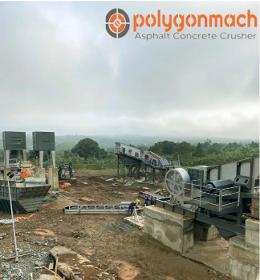
POLYGONMACH MAKINE SANAYI VE TICARET LTD STI
Turkey
700-1000 tph Riverstone Crushing and Screening Plants are sophisticated facilities designed to process large quantities of Riverstones into high-quality aggregates at an impressive throughput capacity ranging from 700 to 1000 tons per hour. These plants consist of specialized primary crushing equipment, advanced screening machinery, and efficient conveyors tailored to handle substantial volumes of Riverstones. The primary crushers, such as jaw crushers and impact crushers, play a pivotal role in breaking down the raw Riverstones into smaller fragments at the initial stage of the processing cycle. This primary crushing phase is essential for preparing the raw material for subsequent processing stages by effectively reducing the size of the Riverstones within the specified high throughput capacity range.
Request for a quoteResults for
Aggregates - Import exportNumber of results
57 ProductsCompany type
Category
- Crushing and grinding machinery (44)
- Mining and quarrying - machinery and equipment (4)
- Concrete preparing - machinery and equipment (2)
- Compactors and crushers (2)
- Concrete constructions (2)
- Additives, cement and mortar (1)
- Bulk materials for construction (1)
- Cements, special (1)
- Construction - Machines & Equipment (1)
- Dental preparations (1)
- Industrial washing facilities (1)